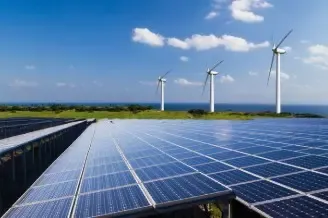Significant Increase in GCCs Targeting Renewable Energy in India

Synopsis
Key Takeaways
- India's GCCs in renewable energy are on the rise.
- Over 30 energy sector GCCs exist in the country.
- Significant offshoring opportunities across various sectors.
- Growing workforce with millions of STEM graduates.
- Promising future for GCCs and digital transformation in energy.
New Delhi, April 12 (NationPress) As global capability centres (GCCs) continue to expand in India, centres that concentrate on renewable energy are also experiencing notable growth, presenting substantial offshoring prospects across upstream, midstream, and downstream sectors.
India is currently witnessing a remarkable increase in GCCs catering to fields such as oil and gas, power and utilities, renewable energy, and mining.
The nation is recognized as one of the top GCC destinations worldwide, serving as the preferred location for organizations embarking on their GCC journey, with numerous options available in cities like Bengaluru, Mumbai, Pune, Delhi-NCR, Hyderabad, and Chennai.
“The connection between India's expanding GCC ecosystem and its comprehensive energy sector exemplifies a narrative of synergy and innovation. India accommodates over 30 energy sector GCCs, with centres distributed nationwide dedicated to fostering innovation through digital transformation and automation,” as stated in a recent EY report.
Leaders in the energy industry have established a robust presence in Indian cities such as Bengaluru, Chennai, and Pune.
These corporations are harnessing India’s strengths to optimize their operations and enhance processes in energy production and distribution, making a significant impact on the modernization of global energy infrastructure.
India’s energy sector is driven by a diverse and skilled workforce, boasting 2.5 million STEM graduates and 1.5 million engineering students graduating each year.
Research by EY indicates that over 20,000 individuals are employed in energy GCCs, which are crucial for innovation and meeting the growing energy demands.
The renewable energy sector is experiencing substantial expansion, with wind energy capacity reaching 42.8 GW as of April 2023 and projected to escalate to 63 GW by 2030.
Additionally, Bengaluru is emerging as a hub for specialists skilled in turbine micro-siting, GIS mapping, and aerodynamic modelling—expertise essential for advancing wind energy infrastructure.
At the same time, the hydrogen energy sector is gaining traction, with key talent clusters in Mumbai, Pune, Ahmedabad, and Chennai. These areas are home to professionals specializing in hydrogen blending, storage solutions, and refinery operations, all critical to supporting India’s transition to green hydrogen solutions.
“The future for GCCs within India’s energy sector appears promising, providing new entrants the opportunity to capitalize on a favorable business landscape and skilled workforce. Established GCCs can enhance competitiveness and promote digital transformation in the energy industry by expanding their service offerings,” the report highlights.
The GCC market in India has seen impressive growth, with the market size reaching $64 billion and a CAGR of approximately 9.8% for FY2019-2024.
Currently, India hosts over 1,700 GCCs, employing more than 1.9 million individuals and accounting for 55% of the global share.
By 2030, it is estimated that India will have approximately 2,200 to 2,500 GCCs, with a projected market size surging to $110 billion and total employment increasing to 2.8 million.










